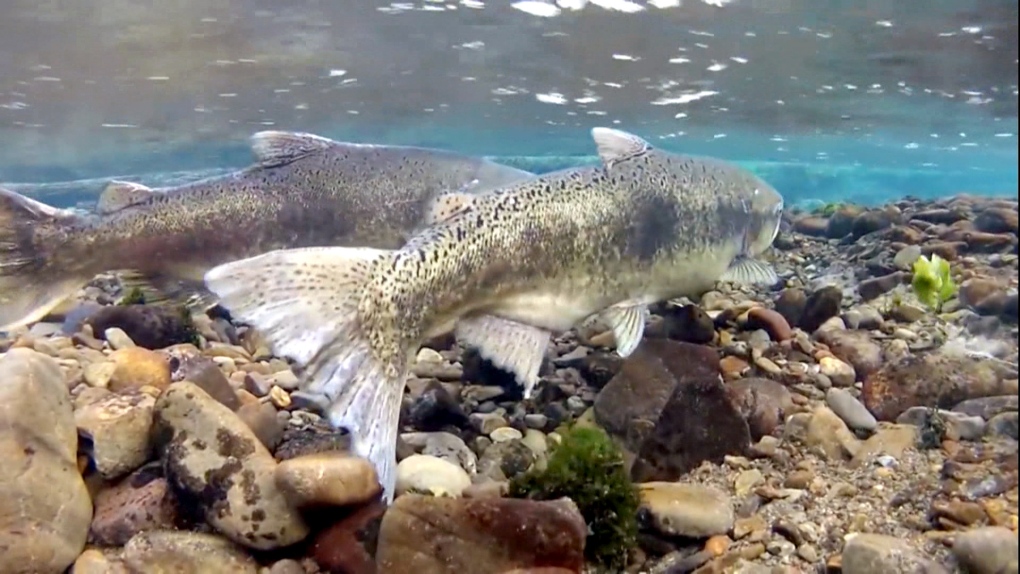Research spotlights the impact of climate change on Pacific salmon migration

Climate change is knocking some Pacific salmon out of alignment with the growth of the ocean plankton they eat to survive, new research says.
In the largest data set ever gathered on the timing of juvenile salmon migration, research found the changing climate is causing some salmon populations to migrate earlier out of step with plankton blooms that are also affected by changing weather patterns.
Lead author Sam Wilson said that as climate change continues the two will match less and less, putting salmon survival at risk.
“The coastal ocean is changing in one way and Pacific salmon are changing in a myriad of other ways and those ways don't always align,” said Wilson, a post-doctoral researcher in the salmon watersheds lab at Simon Fraser University.
Numerous species of Pacific salmon are at risk or even endangered for several reasons, including overharvesting and lack of habitat protections. Wilson suggests the response by the young salmon may be a coping mechanism that helps them survive and reinforces the need to protect biodiversity.
Wilson spent almost five years collecting data from research projects around North America on 66 wild Pacific salmon populations stretching from Oregon to British Columbia to Alaska and dating back at least 20 years.
She found that some salmon populations are migrating earlier, with pink and chum changing fastest at seven days earlier per decade, while other species saw no change on average.
On average, fish are still managing to find the plankton they need, Wilson said, but climate change means they'll be matching up with the blooms less and less.
Major events such as the marine heat wave known as “The Blob,” which persisted in the Pacific Ocean between 2013 and 2016, led to a “big mismatching event” and decreased young salmon survival, she said.
“And that was a harbinger for future climate change.”
The research found that the changes in salmon migration were not predictable, with populations of the same species of salmon behaving differently.
Wilson said that could be a challenge for people in charge of managing and protecting the species, who often use one population as an indicator to predict how the rest of the species is managing.
“So, they might say, Chilko sockeye are not changing their migration timing so we don't have to worry about it. Let's move on to the next topic,” she said.
“But those changes aren't predictable, through space and time.”
The study's authors recommend avoiding a “one-size-fits-all approach” to management, she said.
For those outside of research or salmon management, that confusing lack of predictability is something to be celebrated, Wilson said.
She said the fact that populations have responded differently is an example of biodiversity and a sign salmon have tools to deal with climate change.
“As a scientist, I can tell you if you want to preserve biodiversity, you need to preserve the habitat that underpins that biodiversity,” she said.
“This unpredictability gives me a headache as a scientist trying to predict it. It might give a manager a headache trying to predict it. But it also protects salmon. So, we need to maintain that diversity if we want to keep having salmon in our ocean, and in our lakes and on our tables in future.”
This report by The Canadian Press was first published May 4, 2023
CTVNews.ca Top Stories

Bird flu, measles top 2025 concerns for Canada's chief public health officer
As we enter 2025, Dr. Theresa Tam has her eye on H5N1 bird flu, an emerging virus that had its first human case in Canada this year.
DEVELOPING Body found in wheel well of plane at Maui airport
A person was found dead in the wheel well of a United Airlines flight to Maui on Tuesday.
Raised in Sask. after his family fled Hungary, this man spent decades spying on communists for the RCMP
As a Communist Party member in Calgary in the early 1940s, Frank Hadesbeck performed clerical work at the party office, printed leaflets and sold books.
Police identify victim of Christmas Day homicide in Hintonburg, charge suspect
The Ottawa Police Service says the victim who has been killed on Christmas Day in Hintonburg has been identified.
Christmas shooting at Phoenix airport leaves 3 people wounded
Police are investigating a Christmas shooting at Sky Harbor Airport in Phoenix that left three people injured by gunfire.
Ship remains stalled on St-Lawrence River north of Montreal
A ship that lost power on the St. Lawrence River on Christmas Eve, remains stationary north of Montreal.
Your kid is spending too much time on their phone. Here's what to do about it
Wondering what your teen is up to when you're not around? They are likely on YouTube, TikTok, Instagram or Snapchat, according to a new report.
Bird flu kills more than half the big cats at a Washington sanctuary
Bird flu has been on the rise in Washington state and one sanctuary was hit hard: 20 big cats – more than half of the facility’s population – died over the course of weeks.
6,000 inmates stage Christmas Day escape from high-security Mozambique prison
At least 6,000 inmates escaped from a high-security prison in Mozambique's capital on Christmas Day after a rebellion, the country's police chief said, as widespread post-election riots and violence continue to engulf the country.






























